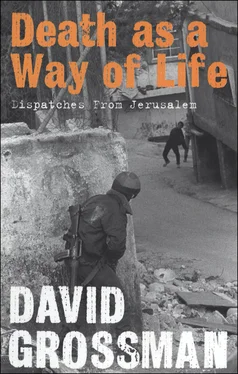David Grossman - Death as a Way of Life
Здесь есть возможность читать онлайн «David Grossman - Death as a Way of Life» весь текст электронной книги совершенно бесплатно (целиком полную версию без сокращений). В некоторых случаях можно слушать аудио, скачать через торрент в формате fb2 и присутствует краткое содержание. Год выпуска: 2013, Издательство: Bloomsbury Publishing, Жанр: Прочая документальная литература, на английском языке. Описание произведения, (предисловие) а так же отзывы посетителей доступны на портале библиотеки ЛибКат.
- Название:Death as a Way of Life
- Автор:
- Издательство:Bloomsbury Publishing
- Жанр:
- Год:2013
- ISBN:нет данных
- Рейтинг книги:5 / 5. Голосов: 1
-
Избранное:Добавить в избранное
- Отзывы:
-
Ваша оценка:
- 100
- 1
- 2
- 3
- 4
- 5
Death as a Way of Life: краткое содержание, описание и аннотация
Предлагаем к чтению аннотацию, описание, краткое содержание или предисловие (зависит от того, что написал сам автор книги «Death as a Way of Life»). Если вы не нашли необходимую информацию о книге — напишите в комментариях, мы постараемся отыскать её.
Death as a Way of Life — читать онлайн бесплатно полную книгу (весь текст) целиком
Ниже представлен текст книги, разбитый по страницам. Система сохранения места последней прочитанной страницы, позволяет с удобством читать онлайн бесплатно книгу «Death as a Way of Life», без необходимости каждый раз заново искать на чём Вы остановились. Поставьте закладку, и сможете в любой момент перейти на страницу, на которой закончили чтение.
Интервал:
Закладка:
Despite all that, early this week, at an army roadblock near Ramallah, several dozen of us, peace activists from both sides, gathered. In the middle of the chaos of hundreds of backed-up and churning vehicles, of people trying uselessly to leave or enter their city, in the face of the shouting and cursing of Palestinians who oppose this desperate initiative to bring people together, Yossi Beilin, one of the fathers of the Oslo agreement, and Yasir Abd Rabbo, the Palestinian Minister of Information and Culture and a close associate of Yasir Arafat, called for a swift resumption of dialogue. Or at least acceptance of American envoy Anthony Zinni’s proposal for a forty-eight-hour cease-fire.
The rest is well known. Neither side honored the cease-fire. Many Israelis and Palestinians did not survive even these mere forty-eight hours. Wednesday night, after an especially bloody attack by Hamas, the Israeli government issued an odd and equivocal statement: Arafat was irrelevant; he was blotted out of the picture. This meant, actually, that the Palestinian people had also been blotted out, along with their justified desires and aspirations. And so any tiny chance for talks, for an agreement, for a more tolerable future, was also blotted out.
A person stands before this reality and his heart breaks, in seeing how the fears and suspicions and worldviews of naysayers succeed, in the end, in proving themselves in the most destructive way possible. How endless malicious, mistaken, suspicious acts by each side have connected one link to the next in an ostensibly logical continuum — logical in the distorted terms of the conflict — until, all at once, it becomes clear how we have ourselves, with our bare hands, garroted our own necks with a bloody chain of violence.
And it could have been otherwise. One can sketch a picture of more merciful circumstances. One’s thoughts skip quickly back. Had Jordan’s King Hussein responded to Moshe Dayan’s invitation to call him, immediately after the 1967 War, to discuss peace between the two countries; had Israel initiated, in talks it held with the Palestinians in the 1970s and 1980s, a bold settlement that would have linked Israel, Jordan, and Palestine in a federation; had Sharon, when he was minister of defense in 1982, not tried to evict Arafat from Lebanon to Tunis but rather allowed him to return to the occupied territories as a leader; had Israel addressed the first Intifada, in 1987, as a Palestinian cry of distress, and tried to respond accordingly rather than simply to repress it; had Yitzhak Rabin not been assassinated; had Hamas suicide bombers not killed hundreds of Israelis in Jerusalem and Tel Aviv in 1995 and 1996, thus helping Benjamin Netanyahu win the prime ministership; had Ehud Barak negotiated at Camp David with greater wisdom and sensitivity; had Arafat had the good judgment to realize the magnitude of the Israeli concessions on offer and not turned so quickly onto the path of violence in September 2000; had Sharon not gone to the Temple Mount; had Arafat truly fought terrorism and not tried to fool the whole world; had …
As the list grows longer, a bitter feeling wells up, that perhaps there really was no other way. That the two nations still are not ready for peace. That neither of them even comprehends what peace means. That even if they know, in theory, how to talk about the “need for peace,” they do not have the strength to go through the profound and painful processes required to bring it about and make it successful. A small number, much too small a number, are still capable of the mental and emotional effort that the complexity of the situation requires. Within the dread that I sense around me, at times I hear a sigh: “Let it end already, one way or another, even in war, but things simply cannot go on as they are now!”
This morning, in the face of the events coming one on the heels of the other, there is no escaping this conclusion: The Israeli brain and the Palestinian brain, which have never known a single day of real peace, have been conditioned to perceive one, unambiguous picture of reality — that of the unending war, of the one-dimensional, stereotypical, monolithically hating, violent enemy.
Yet, even now, more than at any other time, we cannot give up the idea of peace. Attempts at peace, even if they sometimes seem, as I know they do, pathetic, even virtual, are of huge importance in preserving some link between those Israelis and Palestinians who agree that there is no solution other than a political solution. But we must recognize, with much grief, that at this point there is no chance for a political settlement between the two sides. I don’t think I have to explain what that implies.
QED
January 2002
On January 3, 2002, the Israeli navy intercepted the Karine A a ship heading for the Palestinian Authority’s port at Gaza with a cargo of 50 tons of arms and ammunition. Israel claimed that the Palestinian Authority, Iran, and Hezbollah had collaborated in this smuggling operation.
The capture of the Palestinian arms ship means we can breathe easier. This profusion of weapons won’t be aimed at Israel. There’s also a sense of gratitude toward the soldiers who participated in the raid. But the voices of the spokesmen for the army, the government, and the media evinced an undisguised joy at having finally found “conclusive evidence” of the Palestinians’ nefarious terrorist intentions. As they would have it, it is now beyond a doubt that “the Palestinian Authority is infected with terror from the soles of its feet to its scalp,” as Shaul Mofaz, the Army’s Chief of Staff, declared at the press conference. He seemed to be trying, for a moment, to bring back the glory of the heroic 1950s, or even of the legendary Entebbe operation of 1974.
But what proof is this? It is proof that if you oppress a nation for thirty-five years, humiliate its leader, abuse its people, and offer them no hope, that nation will seek to protect itself however it can. Would any of us act differently than the Palestinians if we faced the same situation? Didn’t we, in fact, do exactly the same during the years we spent, at different times in our history, under occupation and tyranny?
Avshalom Feinberg and Yosef Lishansky traveled to Cairo in 1916 to get money for the NILI underground organization so that the Jewish community in Palestine could defend itself against the Turks; members of the three underground organizations of the 1930s and ’40s — Haganah, LEHI, and Etzel — acquired and stashed away as many weapons as possible, and the caches where they hid these arms still symbolize the Jewish struggle for survival and freedom. We still admire the Zionist fighters who participated in daring operations to capture arms during the period of the British Mandate, operations that the British considered acts of terror.
But when we performed such exploits, they were not terrorism. They were the legitimate actions of a nation that was fighting for its independence. When the Palestinians behave similarly, it is seen as proof of everything that we have been so keen to prove for years.
It was embarrassing and infuriating to hear Mofaz and the minister of defense, Benjamin Ben-Eliezer, lecture the Palestinians on how they are “wasting their money on buying arms instead of taking care of their hungry, indigent population.” These are the words of men whose soldiers — following instructions from the government — are abusing Palestinians day and night, depriving them of food and property. It was no less shameful to observe the Israeli press coverage of the ship’s capture. The reporters, awestruck at the heroism of our soldiers, all without exception embraced the sanctimonious assertions of the prime minister and chief of staff about how murder and terrorism burn in the hearts of the Palestinians almost as a second nature.
Читать дальшеИнтервал:
Закладка:
Похожие книги на «Death as a Way of Life»
Представляем Вашему вниманию похожие книги на «Death as a Way of Life» списком для выбора. Мы отобрали схожую по названию и смыслу литературу в надежде предоставить читателям больше вариантов отыскать новые, интересные, ещё непрочитанные произведения.
Обсуждение, отзывы о книге «Death as a Way of Life» и просто собственные мнения читателей. Оставьте ваши комментарии, напишите, что Вы думаете о произведении, его смысле или главных героях. Укажите что конкретно понравилось, а что нет, и почему Вы так считаете.












